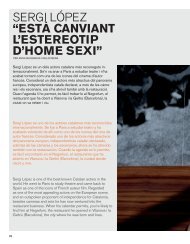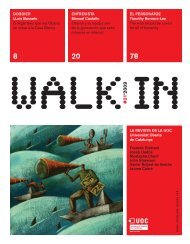II La UOC fa 15 anys II / La UOC cumple 15 años II / The ... - Walk In
II La UOC fa 15 anys II / La UOC cumple 15 años II / The ... - Walk In
II La UOC fa 15 anys II / La UOC cumple 15 años II / The ... - Walk In
You also want an ePaper? Increase the reach of your titles
YUMPU automatically turns print PDFs into web optimized ePapers that Google loves.
ENTREVISTA/<br />
LOUISE BERTRAND<br />
“L’ENSENYAMENT VIRTUAL<br />
NO TÉ LÍMITS”<br />
PER GLORIA ZORRILLA<br />
MÓN <strong>UOC</strong> XI<br />
David Campos<br />
Després de passar uns mesos a Barcelona, com valora la <strong>UOC</strong>? És<br />
una universitat molt dinàmica i amb la grandària justa. Hi ha universitats<br />
molt grans que, a causa de la magnitud que tenen, els costa molt<br />
avançar. El que és interessant de la <strong>UOC</strong> és que és prou gran com<br />
perquè se la tingui en compte però no tant com per paralitzar-se i no<br />
poder avançar. També crec que és molt interessant el compromís i<br />
el suport del govern de Catalunya. Fa quinze <strong>anys</strong>, la Generalitat va<br />
decidir que volia fer una universitat virtual. El compromís polític és<br />
molt important per impulsar un projecte com aquest. Nosaltres vam<br />
tenir una mica de suport polític al començament, però no vam tenir<br />
mai l’autonomia ni el marge de maniobra de la <strong>UOC</strong>. Per a mi, les<br />
universitats més grans no són sempre les millors.<br />
Quines diferències ha trobat amb Téluq? Es tracta de dues universitats<br />
amb molts punts en comú, com ara la manera de funcionar<br />
Tras pasar unos meses en Barcelona, ¿cómo valora la <strong>UOC</strong>? Es una<br />
universidad muy dinámica y con el tamaño justo. Hay universidades<br />
muy grandes a las que, por su dimensión, les cuesta mucho avanzar.<br />
Lo interesante de la <strong>UOC</strong> es que es lo suficientemente grande como<br />
para ser tenida en cuenta pero no tanto como para anquilosarse y<br />
no poder avanzar. También veo muy interesante el compromiso y el<br />
apoyo del gobierno de Cataluña. Hace quince <strong>años</strong>, la Generalitat<br />
decidió que quería hacer una universidad virtual. El compromiso<br />
político es muy importante para impulsar un proyecto así. Nosotros<br />
tuvimos un poco de apoyo político al principio, pero nunca<br />
la autonomía y el margen de maniobra de la <strong>UOC</strong>. Para mí, las<br />
universidades más grandes no son siempre las mejores.<br />
¿Qué diferencias ha encontrado con Téluq? Son dos universidades<br />
con muchos puntos en común, como por ejemplo, la manera<br />
After spending a few months in Barcelona, what do you think of the<br />
<strong>UOC</strong>? It’s a very dynamic university and it’s the perfect size. <strong>The</strong>re<br />
are very large universities which have difficulty moving forward due<br />
to their size. <strong>The</strong> interesting thing about the <strong>UOC</strong> is that it is big<br />
enough to be taken seriously but not so big that it stands still. <strong>The</strong><br />
commitment and support of the Catalan Government is also significant.<br />
Fifteen years ago the Generalitat decided that it wanted to<br />
create a virtual university. Political commitment is extremely important<br />
in pushing through a project like this. At Téluq, we had a<br />
little political support at the beginning, but not the independence<br />
and flexibility that the <strong>UOC</strong> has had. <strong>In</strong> my opinion, the biggest<br />
universities aren’t always the best.<br />
How does it differ from Téluq? <strong>The</strong> two universities have many things<br />
in common, like the way tutors work, but also some differences. <strong>The</strong><br />
amb tutors, i algunes diferències. <strong>La</strong> <strong>UOC</strong> és molt més jove i va<br />
néixer amb la vocació de ser exclusivament una universitat virtual. <strong>La</strong><br />
Téluq, en canvi, va començar <strong>fa</strong> 37 <strong>anys</strong>, a partir de la Universitat del<br />
Quebec a Montreal (UQAM), i ha evolucionat molt amb les noves<br />
tecnologies: abans, les consultes dels alumnes eren per telèfon i per<br />
correu postal. Tenim uns 18.000 estudiants a l’any. De tots ells, un<br />
90% són gent treballadora i un 70% són dones. L’edat dels estudiants<br />
es va reduint amb els <strong>anys</strong>. Fins l’any 2000, la mitjana era de 40 <strong>anys</strong><br />
i ara és de 32 o 33. <strong>La</strong> majoria són de la regió de Montreal i de l’àrea<br />
del Quebec. Són gent que té un accés fàcil als campus físics però, per<br />
qüestions d’horari, pels fills o per la seva situació <strong>fa</strong>miliar prefereixen<br />
estudiar en una universitat virtual.<br />
Amb la seva experiència d’<strong>anys</strong>, pot pronosticar com serà el futur de<br />
la universitat no presencial? Fa quatre o cinc <strong>anys</strong> vam voler establir<br />
de funcionar con tutores, y algunas diferencias. <strong>La</strong> <strong>UOC</strong> es mucho<br />
más joven y nació con la vocación de ser sólo y exclusivamente<br />
una universidad virtual. <strong>La</strong> Téluq, sin embargo, empezó hace<br />
37 <strong>años</strong>, a partir de la Universidad de Quebec en Montreal<br />
(UQAM), y ha evolucionado enormemente con las nuevas tecnologías:<br />
antes las consultas de los alumnos eran por teléfono y por<br />
correspondencia. Tenemos unos 18.000 estudiantes al año. De ellos,<br />
un 90% son gente trabajadora y un 70% son mujeres. <strong>La</strong> edad de<br />
los estudiantes se va reduciendo con los <strong>años</strong>. Hasta el año 2000, la<br />
media era de 40 <strong>años</strong>, y ahora está en 32 o 33. <strong>La</strong> mayoría provienen<br />
de la región de Montreal y el área de Quebec. Son gente que tiene<br />
fácil acceso a los campus físicos pero, por horarios, hijos o situación<br />
<strong>fa</strong>miliar prefieren estudiar en una universidad virtual.<br />
Tras sus <strong>años</strong> de experiencia, ¿puede pronosticar cómo será en<br />
<strong>UOC</strong> is much younger and was created solely as a virtual university.<br />
Téluq however, was founded 37 years ago, as part of the University<br />
of Quebec in Montreal (UQAM) and has developed greatly as a<br />
result of new technology: previously tutorials with students took<br />
place by telephone or letter. <strong>The</strong>re are 18.000 students each year.<br />
Of those, 90% are in employment and 70% are women. <strong>The</strong> average<br />
age of students goes down each year. Until the year 2000 the average<br />
age was 40, now it’s 32 or 33. <strong>The</strong> majority come from the Montreal<br />
region and the province of Quebec. <strong>The</strong>y are people who have access<br />
to a physical campus, yet, due to their hours, children or other <strong>fa</strong>mily<br />
commitments, prefer to study at a virtual university.<br />
With your background, can you predict what the future of the online<br />
university will be? Four or five years ago, in Quebec, we wanted to<br />
introduce bimodal or blended courses, ones which combined ele-<br />
>><br />
>><br />
>>





